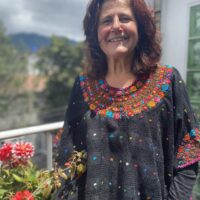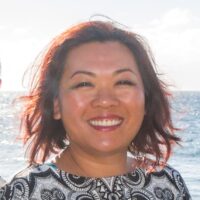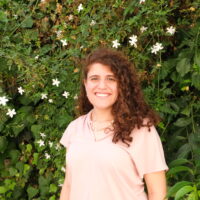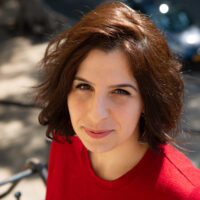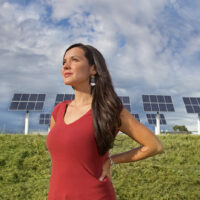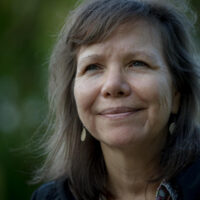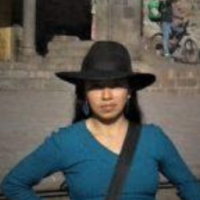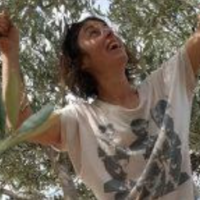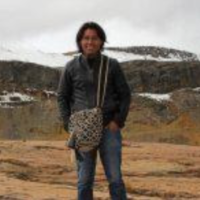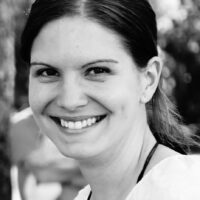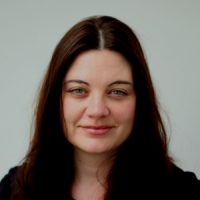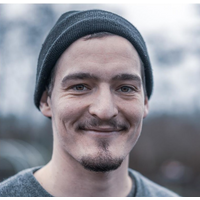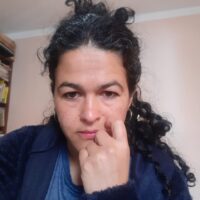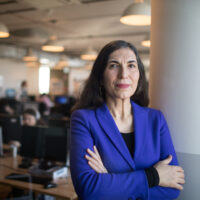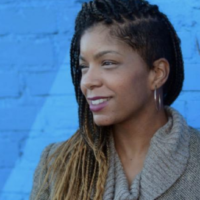The 2021 Conference
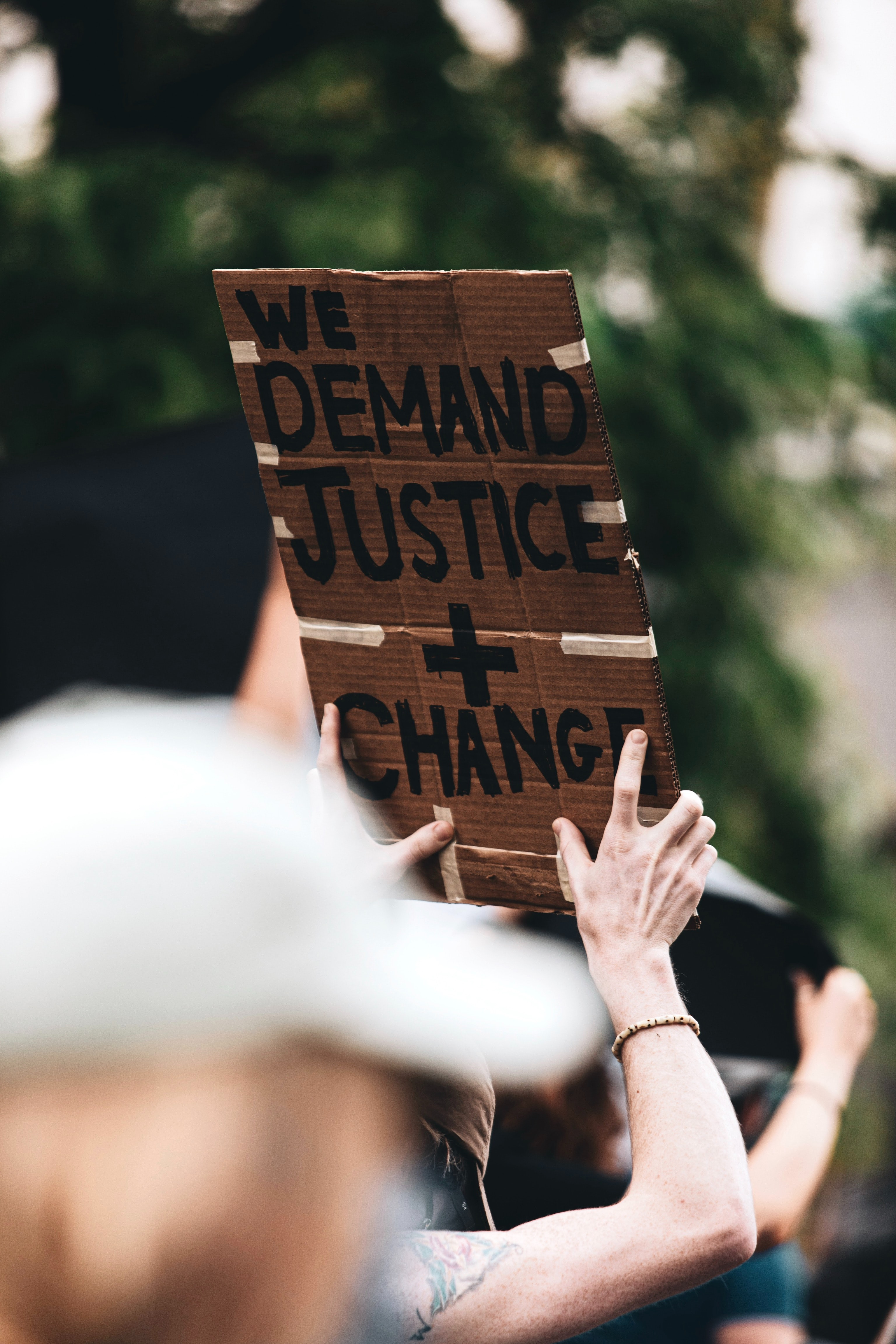 Dear EDGE friends,
Dear EDGE friends,
Thank you for joining us at the EDGE Annual Conference “Building Collective Power for Change”, which took place from 11-15 October 2021.
Many of us are still longing for the time when we will be together in person again. This said, we were really glad to spend some time in community with you all, even if only virtually. We are aware that, even though some of our members from the Global North are already be vaccinated, many of our members and social movement partners from the Global South still are not. For this reasons, in line with our values of collective care, solidarity and inclusivity, we took the decision of holding a digital conference instead.
The EDGE Annual Conference took place from 11-15 October 2021, as a space for funders and social movements to connect, learn and organize together in support of the systems change we are in need of. EDGE members and friends had the opportunity to reconnect with each other, share practices and tools and coordinate around future activities.
Even though we went virtual, the conference included open spaces, panel conversations and workshops, and in order to practice language justice, we are excited to share that we translated to and from English, Spanish and French throughout most of the sessions.
Check the session below to be rewatch the sessions and check all the resources.
Thank you for joining us!
— The EDGE Team
EDGE CONFERENCE REPORT
The EDGE Conference Report 2021 is now out! Feel free to share it with anyone interested!
KEYNOTE SESSIONS
Click on the button to access all information on the three Keynote Sessions.
CLIMATE JUSTICE SESSIONS
During our conference, climate justice was a central topic of conversation in our sessions and trainings. By clicking on the below button, you’ll be able to access recordings, resources and connecting with the speakers and organizing of these sessions.
Honoring Indigenous Day Plenary Session
Oct 11 was Indigenous Peoples Day. We wanted to recognise this with a plenary session on Indigenous Rights, on promoting and protecting traditional knowledge and self-determination. Our panel of speakers from Indigenous-led organisations discussed this as well as the role of funders in supporting Indigenous Peoples.
CONFERENCE TRAININGS
We partnered with Grassroots Global Justice Alliance, It Takes Roots and Just Associates (JASS) to offer three incredible training sessions for funders and civil society partners .
The first training focused on concepts and strategies that are key to Climate Justice such as the power of grassroots organizations and the movement ecosystem, and the role of philanthropy in shifting resources and power back to communities.
The second training was a Feminist Framework for Funders offered by Grassroots Global Justice.
The third training was a Movement Building School – Feminist Tools and Strategies, organised by JASS. Collectively we explored the theoretical and historical intersections of patriarchy, homophobia, transphobia, white supremacy and climate change.
WHERE
The virtual conference was hosted on Canapii, an online platform where we uploaded all the information related to our event, including who participated, sessions’ information, recordings and additional resources.
OPEN SPACE SESSIONS
- An experimental systems change fund led by practitioners
- Whistleblowing : a tool for social justice and systemic change ?
- The False Promise of Bioenergy
- On the Right Track - Feminism defending democracy and Human Rights
- Why age matters in intersectional approaches
- Building Accountability for White Folx Undertaking Anti-racist/Decolonizing Work
- Right Tree, Right Place, Right Community:The Impact of Reforestation Initiatives on Health Equity
- Peer learning space: funder organizing journeys
- Participatory grantmaking in action: Exchange with pioneers and practitioners
- Strengthening Support for Leadership Transitions
- Cultivating deep trust as a base for philanthropy and movement-building
- Reparations, the elephant in the climate movement
- When Funders Take a Stand: on fortress conservation and protected areas
- Will Liberation Be Funded?: PGM & Other Alternatives to Donor Dependence in Palestine
- How Healing Justice is Critical in the Climate Crisis to Build our Collective Power
- Safe Landing: A Just Transition with Aviation Workers
- Strengthen Climate Resilience Through Land Rights And Just Conservation
- Stories that Matter: How inclusive journalism fuels social change
- #MakingDifferentChoices: Letting the money flow (A simultaneous event with Healing Solidarity′s annual conference)
- Digital Community Building Towards Change
- Racial, Social, and Economic Justice: New Opportunities to Push for Change through the Courts
- Feminists confronting the far right: obstructing their agendas and advancing our visions
- Decolonizing Philanthropy with Flow Funding
- Solidaridad y Poder - Solidarity and Power
- Supporting community-led land & water management practices – A roadmap to re-direct money flows
- Why organise rich people for social justice? Our contradictions and questions.
- Bridging the gap between the climate rationale and local community needs: How to collectively organize to fund locally shaped climate solutions.
- Luchas anti-extractivistas y feministas: ¿Cuáles son los retos para las mujeres en el contexto Boliviano? - Fondo de Mujeres Bolivia (Anti-extractivist and feminist struggles: What are the challenges for women in the Bolivian context? - Bolivia Women′s Fund)
- Care session: Voicing Power- singing workshop /Encontrando (nos) with Eme, La Mamba, Antay
- Care session: Dragking with Jamie Fuxx
- Care session: Yoga with Maru
- Speculating on Responsible Fiscal Sponsorship
SESSION DETAILS
We need to convince donors that it’s easy to support systems changing initiatives, and that giving power to practitioners is the right thing to do. To that end, leapcollective.org wants to set up a small fund (~500k €), led by practitioners, that will support a small number of systems-changing initiatives and then talk about the lessons learned. As a donor, join the session if you want to do get involved with systems change and participation. As a practitioner, join the session to give us feedback on the design.
SESSION RECORDINGS
SPEAKER(S)
Odin Mühlenbein is a Partner at Ashoka Germany and Co-Lead of the Systems Unit at Ashoka 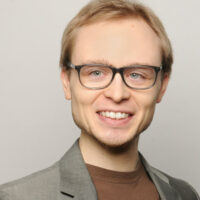 Globalizer. Ashoka Globalizer is a global strategy program that focuses on systemic impact. Odin has been developing such strategies with over 100 leading social entrepreneurs, as well as many of the tools that Ashoka uses in the area of systems change. He published several reports on the topic. His articles appeared both in sector magazines (SSIR, SIJ) and inoutlets for the general public (WEF Agenda, ZEIT).
Globalizer. Ashoka Globalizer is a global strategy program that focuses on systemic impact. Odin has been developing such strategies with over 100 leading social entrepreneurs, as well as many of the tools that Ashoka uses in the area of systems change. He published several reports on the topic. His articles appeared both in sector magazines (SSIR, SIJ) and inoutlets for the general public (WEF Agenda, ZEIT).
Before Ashoka, Odin was a consultant at McKinsey & Company and co-founded two social ventures. He got Masters in Philosophy, Logic, and Political Sciences with studies in Munich, Oxford, and Cambridge.
SESSION DETAILS
Whistleblowers report human rights, environmental, financial abuses that are most often controlled or covered up against the citizens’ right to know. They are democratic watchdogs who disclose information of general interest in the name of ethics but who often suffer reprisals aimed at silencing them, thus placing them in situations of precariousness, insecurity and vulnerability. This three-voice session combines stories of whistleblowers, experiences of NGOs that fight for their rights and of funders involved to support them. It will highlight this specific form of civic engagement and its contribution to social justice and systemic change in the world.
SESSION RECORDING
SESSION SPEAKER(S)
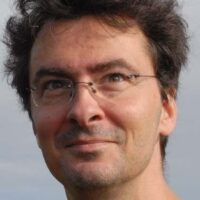 Glen Millot, Délégué Général de la Maison des Lanceurs d’Alerte. He is the executive officer of Maison des Lanceurs d’Alerte (MLA), which he helped create by leading its steering committee before its official launch in October 2018. He is also a coordinator at Sciences Citoyennes,where he is in charge, amongst other work programmes, of the activities regarding whistleblowing. He has been working on several French bills since 2012, the first dealing with public health and environmental issues in 2012-2013 and on directives on trade secrets or on Whistlebowers. Since then, he organized mobilisations, conferences and seminars and wrote or contributed to several position papers on whistleblowing issues, advocating for the role of NGOs and whistleblowing in scientific fields.
Glen Millot, Délégué Général de la Maison des Lanceurs d’Alerte. He is the executive officer of Maison des Lanceurs d’Alerte (MLA), which he helped create by leading its steering committee before its official launch in October 2018. He is also a coordinator at Sciences Citoyennes,where he is in charge, amongst other work programmes, of the activities regarding whistleblowing. He has been working on several French bills since 2012, the first dealing with public health and environmental issues in 2012-2013 and on directives on trade secrets or on Whistlebowers. Since then, he organized mobilisations, conferences and seminars and wrote or contributed to several position papers on whistleblowing issues, advocating for the role of NGOs and whistleblowing in scientific fields.
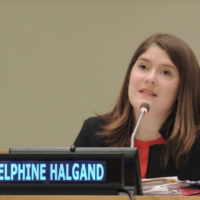 Delphine Halgand-Mishra, Executive Director of The Signals Network. She is the Executive Director of The Signals Network, a non-profit organization which supports whistleblowers who have shared public interest information with the press. She is a Shuttleworth Foundation fellow and a CIGI senior fellow as an expert on press freedom and regulatory frameworks for platforms. She was the lead rapporteur for the Forum on Information and Democracy’s report on infodemics, which offered 250 recommendations to governments and platforms on how to end infodemics. She previously served for six years as Reporters Without Borders’ North America Director, advocating for journalists, bloggers, and media rights worldwide. Delphine regularly appears on American (CNN, Fox News, PBS, Democracy Now!,..), foreign media (BBC World TV, Al Jazeera, France 24) and gives lectures and conferences at U.S. universities (Harvard, UCLA, Yale, Columbia) on issues of press freedom violations. In May 2017, she received the 2017 James W Foley American Hostage Freedom Award for her work assisting American journalists detained abroad. Earlier in her career, she served as Press attaché in charge of outreach at the French Embassy to the U.S. Since graduating from Sciences Po Paris with an M.A. in Journalism, Delphine has worked as an economics correspondent for various French media (such as Le Monde, Les Echos, L’Express), focusing mainly on international politics and macroeconomic issues.
Delphine Halgand-Mishra, Executive Director of The Signals Network. She is the Executive Director of The Signals Network, a non-profit organization which supports whistleblowers who have shared public interest information with the press. She is a Shuttleworth Foundation fellow and a CIGI senior fellow as an expert on press freedom and regulatory frameworks for platforms. She was the lead rapporteur for the Forum on Information and Democracy’s report on infodemics, which offered 250 recommendations to governments and platforms on how to end infodemics. She previously served for six years as Reporters Without Borders’ North America Director, advocating for journalists, bloggers, and media rights worldwide. Delphine regularly appears on American (CNN, Fox News, PBS, Democracy Now!,..), foreign media (BBC World TV, Al Jazeera, France 24) and gives lectures and conferences at U.S. universities (Harvard, UCLA, Yale, Columbia) on issues of press freedom violations. In May 2017, she received the 2017 James W Foley American Hostage Freedom Award for her work assisting American journalists detained abroad. Earlier in her career, she served as Press attaché in charge of outreach at the French Embassy to the U.S. Since graduating from Sciences Po Paris with an M.A. in Journalism, Delphine has worked as an economics correspondent for various French media (such as Le Monde, Les Echos, L’Express), focusing mainly on international politics and macroeconomic issues.
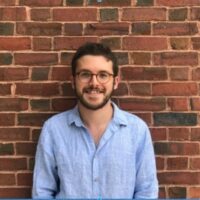 Gabriel Bourdon-Fattal, Chef de projet de PPLAAF (Platform to Protect Whistleblowers in Africa). Gabriel Bourdon-Fattal is a project manager at the Platform to Protect Whistleblowers in Africa (PPLAAF). Gabriel is an experienced human rights jurist and campaigner. Among others, Gabriel led an organization against the deportation of migrant workers’ children and worked on environmental justice issues in the Middle East. Gabriel has an LL .B from the University of Haifa and a Master in African Legal Studies from Université Paris 1 Pantheon-Sorbonne. Gabriel is an alumnus of the European Center for Constitutional and Human Rights in Berlin and of the Our Generation Speaks Fellowship in Boston.
Gabriel Bourdon-Fattal, Chef de projet de PPLAAF (Platform to Protect Whistleblowers in Africa). Gabriel Bourdon-Fattal is a project manager at the Platform to Protect Whistleblowers in Africa (PPLAAF). Gabriel is an experienced human rights jurist and campaigner. Among others, Gabriel led an organization against the deportation of migrant workers’ children and worked on environmental justice issues in the Middle East. Gabriel has an LL .B from the University of Haifa and a Master in African Legal Studies from Université Paris 1 Pantheon-Sorbonne. Gabriel is an alumnus of the European Center for Constitutional and Human Rights in Berlin and of the Our Generation Speaks Fellowship in Boston.
Juliette Decoster, Responsable de programmes à la Fondation Charles Léopold Mayer James Dunne, Whistleblower (Qosmos case). She is Programme Officer at the Charles Leopold Mayer Foundation. The Charles Leopold Mayer Foundation mission is to provide l
ong term core grants to civil society organisations and movements advocating for a just transition towards sustainable societies. Juliette oversees different programmes on democracy, independent journalism and media, corporate capture of power and digitalisation, etc . She developed the programme on Protection of Whistleblowers and Whistleblowing in the Foundation. Previously, Juliette worked in NGOs in Brussels, Tirana (Albania) and Paris on European policies and international relations. She has studied political sciences. She is a member of the Advisory Board of Ariadne, a network of Funders for Social Change and Human Rights.
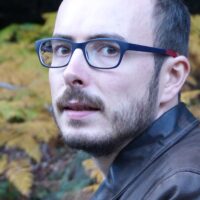 Antoine Deltour, Whistleblower (LuxLeaks)James Dunne, Whistleblower (Qosmos case). He is the main whistleblower in the LuxLeaks case. He worked as an auditor for PwC Luxembourg from 2008 to 2010. When he resigned, he copied hundreds of tax rulings that have lead, amongst other documents, to the so-called “LuxLeaks scandal”. The disclosure of large-scale tax avoidance practices fostered several initiatives for better tax justice. But Antoine Deltour faced criminal charges in Luxembourg. After a first conviction to a 12-months suspended sentence in 2016 followed by several appeals, he was finally recognized as a whistleblower and was acquitted for all the charges related to the Luxleaks. He is now working for the French statistics administration and is involved in several organizations protecting whistleblowers.
Antoine Deltour, Whistleblower (LuxLeaks)James Dunne, Whistleblower (Qosmos case). He is the main whistleblower in the LuxLeaks case. He worked as an auditor for PwC Luxembourg from 2008 to 2010. When he resigned, he copied hundreds of tax rulings that have lead, amongst other documents, to the so-called “LuxLeaks scandal”. The disclosure of large-scale tax avoidance practices fostered several initiatives for better tax justice. But Antoine Deltour faced criminal charges in Luxembourg. After a first conviction to a 12-months suspended sentence in 2016 followed by several appeals, he was finally recognized as a whistleblower and was acquitted for all the charges related to the Luxleaks. He is now working for the French statistics administration and is involved in several organizations protecting whistleblowers.
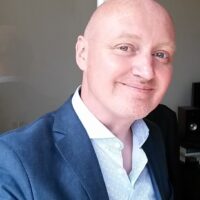 James Dunne, Whistleblower (Qosmos case).
James Dunne, Whistleblower (Qosmos case).
He’s Technical Documentation Manager at the French DPI specialist Qosmos, James Dunne was fired in December 2012 for publicly denouncing his employer’s involvement in the “Asfador” contract to provide mass surveillance technology to the Syrian regime of Bashar al-Assad, and for providing documentary evidence of this involvement to the International Federation for Human Rights (FIDH).
On 23 May 2013, James testified at the Crimes against Humanity division of the Paris High Court, as part of a procedure for “complicity in torture” brought against his former employer by the FIDH. This was about ten days before the first Snowden revelations, when mass surveillance was not yet a central concern of our connected world.
While at Qosmos, James Dunne also worked on the “Eagle” program from january 2007 to Novembre 2008, in association with the French company Amesys, discovering in 2011 that this program, organized by the Sarkozy government, was to supply mass surveillance tech to the Gadaffi regime in Libya. Having supplied documentary proof of the involvement of Qosmos in the Eagle program, James testified in the Amesys case on May 6, 2021. In june 2021, the executives of Amesys were formally charged with “complicity to torture”.
James Dunne won his labor courts case against Qosmos for unfair dismissal in 2015. And in january 2017, he won two diffamation cases brought against him by Qosmos, James Dunne is from Dublin, Ireland and lives in Paris.
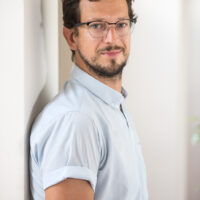 Peter Matjasic, Senior Program Officer at Open Society Initiative for Europe (OSIFE). Peter Matjašič is a senior program officer at Open Society Initiative for Europe, part of Open Society Foundations based in Barcelona where he leads the work on whistleblowing and right to protest, which links to civic space issues in Western Europe. Previously, he led the work on reclaiming family values and OSIFE’s engagement around European Elections 2014. Prior to joining OSF, he had been active in the field of youth work for 12 years, starting with the Young European Federalists and finishing as president of the European Youth Forum (2011- 2014) advocating for the rights of young people and their organizations. Europe, human rights, gender justice, citizen’s empowerment, tennis, and languages (he speaks eight) are his main passions.
Peter Matjasic, Senior Program Officer at Open Society Initiative for Europe (OSIFE). Peter Matjašič is a senior program officer at Open Society Initiative for Europe, part of Open Society Foundations based in Barcelona where he leads the work on whistleblowing and right to protest, which links to civic space issues in Western Europe. Previously, he led the work on reclaiming family values and OSIFE’s engagement around European Elections 2014. Prior to joining OSF, he had been active in the field of youth work for 12 years, starting with the Young European Federalists and finishing as president of the European Youth Forum (2011- 2014) advocating for the rights of young people and their organizations. Europe, human rights, gender justice, citizen’s empowerment, tennis, and languages (he speaks eight) are his main passions.
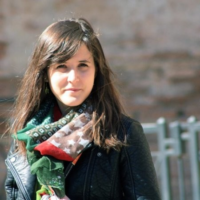 Blandine Sillard, Maison des Lanceurs d’Alerte. Blandine Sillard is in charge of the development of the Maison des Lanceurs d’Alerte. She has a doctorate in political science and has previously studied the evolution of citizen engagement and democratic participation in France.
Blandine Sillard, Maison des Lanceurs d’Alerte. Blandine Sillard is in charge of the development of the Maison des Lanceurs d’Alerte. She has a doctorate in political science and has previously studied the evolution of citizen engagement and democratic participation in France.
SESSION DETAILS
As momentum grows to wean global society from fossil fuels, extractive industry and energy sector stakeholders are aggressively promoting biomass energy and biofuels as a climate solution. Yet such a framing of bioenergy could not be further from the truth. Learn from civil society experts about global trends in the promotion of bioenergy with a deep dive on the threats of San Francisco Bay Area refinery conversions to high deforestation risk soy feedstock based diesel and jet fuels, and a close look at the construction of a new soy based jet fuel refinery in Paraguay. This session will help conference participants develop necessary literacy in the false promise of bioenergy which will help climate justice movements invest in actions that will secure a necessary transition from dirty energy in all its forms.
Session Recording
SESSION SPEAKERS
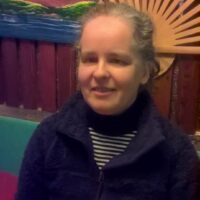 Almuth Ernsting, co-founder and co-director of BIofuelwatch. Almuth Ernsting helped to found Biofuelwatch in 2006. She has been researching different aspects of bioenergy and their impacts, including wood burning for heat and electricity, first and second generation biofuels, biofuels for aviation, and Bioenergy with Carbon Capture and Storage, authoring and co-authoring reports, briefings and articles. Almuth has been actively involved in developing and implementing campaigns against large-scale bioenergy developments that harm the climate, forests, and other ecosystems and that contribute to environmental injustices, including air pollution to land-grabbing. She lives in Edinburgh, Scotland.
Almuth Ernsting, co-founder and co-director of BIofuelwatch. Almuth Ernsting helped to found Biofuelwatch in 2006. She has been researching different aspects of bioenergy and their impacts, including wood burning for heat and electricity, first and second generation biofuels, biofuels for aviation, and Bioenergy with Carbon Capture and Storage, authoring and co-authoring reports, briefings and articles. Almuth has been actively involved in developing and implementing campaigns against large-scale bioenergy developments that harm the climate, forests, and other ecosystems and that contribute to environmental injustices, including air pollution to land-grabbing. She lives in Edinburgh, Scotland.
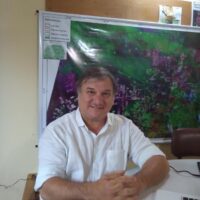 Miguel Lovera, Global Forest Coalition and Iniciativa Amotocodie. Miguel Lovera is an agronomist who dedicated his career to in situ plant conservation through a diverse set of activities ranging from scientific and technical research, policy and advocacy, activism and civil service. The main focus of his work is the understanding of the interface of science and policy.
Miguel Lovera, Global Forest Coalition and Iniciativa Amotocodie. Miguel Lovera is an agronomist who dedicated his career to in situ plant conservation through a diverse set of activities ranging from scientific and technical research, policy and advocacy, activism and civil service. The main focus of his work is the understanding of the interface of science and policy.
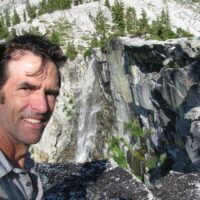 Gary Hughes – Gary is currently working with Biofuelwatch on a broad portfolio of actions specific to California climate and forest policy as well as leading projects in support of partners in the Global Forest Coalition, with a special focus on Chile. Gary also represents Biofuelwatch on the steering committee of the Hands Off Mother Earth (HOME) global campaign against geoengineering. He studied at the University of Oregon (B.Sc. Sociology 1988) and the University of Montana (M.Sc. Environmental Studies 2002), and is currently based in Northern California.
Gary Hughes – Gary is currently working with Biofuelwatch on a broad portfolio of actions specific to California climate and forest policy as well as leading projects in support of partners in the Global Forest Coalition, with a special focus on Chile. Gary also represents Biofuelwatch on the steering committee of the Hands Off Mother Earth (HOME) global campaign against geoengineering. He studied at the University of Oregon (B.Sc. Sociology 1988) and the University of Montana (M.Sc. Environmental Studies 2002), and is currently based in Northern California.
SESSION DETAILS
On the Right Track is a cross-regional initiative of Latin American and European Women’s Funds that strengthen the feminist movement to defend democracy and Human Rights from the attacks of anti-gender and far-right groups. We will present the initiative and the results of an investigation we have done on the attacks against feminist, LBTBI and HR activists.
SESSION SPEAKERS
Maria Palomares Arenas – Calala Fund: Executive Director of Calala Fondo de Mujeres since 2012, graduated in Journalism, with training in Gender and Development and Peace Culture. She has collaborated in different non-governmental cooperation organizations development. In Calala she coordinates the “On the Right Track” initiative and she works with migrant women’s cooperatives to find a new self-managed and profitable self care model.
Sociologist.Activist for women’s human rights with more than 15 years of experience in Colombia. She has worked for a wide range of national and international Human Rights organizations, including the Norwegian Refugee Council and the International Peace Brigades. She has edited and contributed to various publications and has conducted research on the implementation of UN Security Council resolution 1325 for the Massachusetts Institute of Technology / ICAN. She is currently the Executive Director of Fondo Lunaria.
SESSION DETAILS
Ageism is the unfair treatment of a person because of age. The COVID-19 pandemic exposed in a crude light the stereotyping of older people and age discrimination. However, rare were the analyses looking beyond generational comparisons to look at the accumulated disadvantage experienced by some groups when they reach older age. In this session, we invite you to a quick introduction of ageism and why including age in intersectional approaches.
SESSION RECORDINGS
SESSION SPEAKER(S)
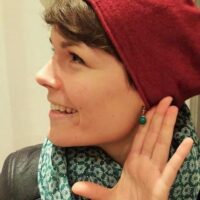 Estelle Huchet – AGE Platform. Estelle joined AGE Platform Europe in 2016. Her role is to coordinate the recruitment of new member organisations and develop activities to strengthen the advocacy capacity of existing members. As campaigns officer, she also develops campaigns and strategic partnerships to channel and amplify the voices of older people and bring our demands for social change to the fore.
Estelle Huchet – AGE Platform. Estelle joined AGE Platform Europe in 2016. Her role is to coordinate the recruitment of new member organisations and develop activities to strengthen the advocacy capacity of existing members. As campaigns officer, she also develops campaigns and strategic partnerships to channel and amplify the voices of older people and bring our demands for social change to the fore.
SESSION DETAILS
Hoping to start a conversation among white-identified funders who recognize that we are accountable to our BIPOC grantees, movement partners, and colleagues in getting real about our anti-racist/decolonizing work. Often these conversations or learning groups end without a real commitment to action. Hoping we can shape something that has accountability baked into it from the start.
Session Slot
Wednesday October 13th 16:00-17:00 UTC
SESSION SPEAKER(S)
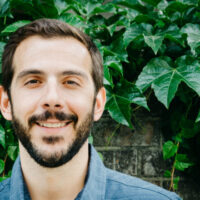 Michael Kourabas — Interim Director for Partner Support & Grantmaking Michael Kourabas works across UUSC’s programs to maximize the impact of its grassroots partners around the world. In addition to helping oversee UUSC’s grantmaking process, Michael has conducted on-the-ground assessments of UUSC’s work in Croatia, Greece, Haiti, Nepal, and the Philippines. Trained as an attorney, Michael has a strong background in human rights law and compliance. In various roles prior to joining UUSC, Michael implemented the United Nations Guiding Principles on Business and Human Rights and worked to support the International Criminal Court’s investigations in Kenya and northern Uganda. He also helped launch one of the nation’s first Business and Human Rights practices at an American law firm. Michael received his undergraduate with honors from the University of Michigan in 2004, and his law degree from William & Mary School of Law in 2008. Michael is passionate about organizing philanthropy for systemic change. He is part of the Engaged Donors for Global Equity (EDGE) Funders Alliance Global Engagement Lab learning community and sits on EDGE’s North American Steering Group. He is also a member of the Cambridge (Massachusetts) Human Rights Commission, to which he was appointed co-chair in 2020.
Michael Kourabas — Interim Director for Partner Support & Grantmaking Michael Kourabas works across UUSC’s programs to maximize the impact of its grassroots partners around the world. In addition to helping oversee UUSC’s grantmaking process, Michael has conducted on-the-ground assessments of UUSC’s work in Croatia, Greece, Haiti, Nepal, and the Philippines. Trained as an attorney, Michael has a strong background in human rights law and compliance. In various roles prior to joining UUSC, Michael implemented the United Nations Guiding Principles on Business and Human Rights and worked to support the International Criminal Court’s investigations in Kenya and northern Uganda. He also helped launch one of the nation’s first Business and Human Rights practices at an American law firm. Michael received his undergraduate with honors from the University of Michigan in 2004, and his law degree from William & Mary School of Law in 2008. Michael is passionate about organizing philanthropy for systemic change. He is part of the Engaged Donors for Global Equity (EDGE) Funders Alliance Global Engagement Lab learning community and sits on EDGE’s North American Steering Group. He is also a member of the Cambridge (Massachusetts) Human Rights Commission, to which he was appointed co-chair in 2020.
SESSION DETAILS
Trees for Climate Health Project Director, Erin Axelrod, will describe how a family foundation that was previously focused on health launched a new reforestation initiative to influence the field of reforestation funding, and catalyze improved health outcomes via a holistic ecological approach. Erin will highlight the “right tree, right place, right community” approach, as well as how it helps to not only support local ecosystems but also bolster the health of communities. For this session, Erin will elaborate on how, through a holistic reforestation initiative, Jonas Philanthropies is investing in the wellbeing of some of the most vulnerable populations around the globe and helping to catalyze improved health outcomes, rooted in community self-determination Trees for Climate Health is committed to putting the power into the hands of climate-vulnerable and under-resourced frontline communities in order to ensure tree planting programs support communities and provide health, economic and ecologic benefits for generations to come.
Session Slot
Tuesday October 12th 16:00-17:00 UTC
SESSION SPEAKER(S)
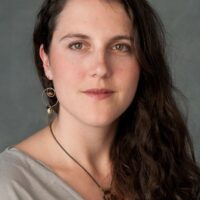 Erin Axelrod Is the Project Director for Jonas Philanthropies Trees for Climate Health project and a Partner/Worker-Owner at LIFT Economy, helping to accelerate the spread of businesses that benefit our climate, specializing in enterprises that address soil and water regeneration and uplift traditional ecological knowledge. In addition to spearheading Jonas Philanthropies Trees for Climate Health project, the ambitious reforestation initiative working to grow over 10 million trees by 2025, Erin also leads LIFT Economy’s regenerative agriculture investor network and a Restorative Ocean Economies Field-Building Initiative. She is a grassroots organizer and an amateur (for love of) ecologist.
Erin Axelrod Is the Project Director for Jonas Philanthropies Trees for Climate Health project and a Partner/Worker-Owner at LIFT Economy, helping to accelerate the spread of businesses that benefit our climate, specializing in enterprises that address soil and water regeneration and uplift traditional ecological knowledge. In addition to spearheading Jonas Philanthropies Trees for Climate Health project, the ambitious reforestation initiative working to grow over 10 million trees by 2025, Erin also leads LIFT Economy’s regenerative agriculture investor network and a Restorative Ocean Economies Field-Building Initiative. She is a grassroots organizer and an amateur (for love of) ecologist.
SESSION DETAILS
Many of us leave conferences like this one full of energy and ideas! And then we bring those ideas to our colleagues/peers who weren’t at the conference, and it can be hard to make progress. This is a space to share things we’ve learned from our efforts to organize our peers, and shift our organizations to fund more social justice movement work.
SESSION SPEAKER(S)
Farhad Ebrahimi – Chorus Foundation
SESSION DETAILS
There is a lot of talk about participatory grantmaking in philanthropy, but there still is some way to go to move from rhetoric to action. What is holding back funders to take the leap? What are the do’s and don’ts in participatory grantmaking, based on the lived experience of practitioners? Do you believe in participatory grantmaking but do you have trouble convincing your board, management and colleagues to take the leap and shift the power?
This is a space to ask us all your questions and to let us know what ammunition you need to convince others to jump on board and practice participatory grantmaking for real! Hear from FundAction, the pioneer activist-led participatory grantmaking fund in Europe, who celebrates 5 years of existence and national funds like Het Actiefonds, based in The Netherlands.
Session Slot
Tuesday October 12th 12:00-13:00 UTC
SESSION SPEAKER(S)
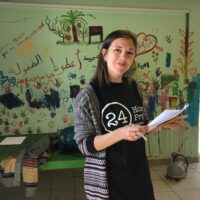 Carmen Dupont – FundAction. Carmen Dupont is an advocate and organiser with over one decade of experience campaigning on the rights of people on the move. She coordinated regional campaigns at Amnesty International before spending several years in Lesvos to support grassroots efforts led by local and refugee activists. Carmen is passionate about connecting people and issues around deep, positive change (Think big or go home!). She believes in the power of curiosity, active listening and asking new questions. This curiosity brought her to FundAction in 2018. In July 2020 she joined the Facilitation Group, who is responsible for the daily coordination. FundAction is a participatory grantmaker, supporting systemic change across Europe. The fund has over 270 members from grassroots initiatives who work on various themes across 29 countries.
Carmen Dupont – FundAction. Carmen Dupont is an advocate and organiser with over one decade of experience campaigning on the rights of people on the move. She coordinated regional campaigns at Amnesty International before spending several years in Lesvos to support grassroots efforts led by local and refugee activists. Carmen is passionate about connecting people and issues around deep, positive change (Think big or go home!). She believes in the power of curiosity, active listening and asking new questions. This curiosity brought her to FundAction in 2018. In July 2020 she joined the Facilitation Group, who is responsible for the daily coordination. FundAction is a participatory grantmaker, supporting systemic change across Europe. The fund has over 270 members from grassroots initiatives who work on various themes across 29 countries.
Stefanos Galountzis – FundAction
Diana Quirschfeld – Het Actiefonds
SESSION DETAILS
Organizational leadership transitions are on the rise everywhere, both in frequency and magnitude of complexity. As more and more leaders choose to step away from their roles, movement actors and funders face difficult questions around individual, organizational, and movement-wide sustainability. Alongside natural cycles of leadership transition, there could be other contributing factors: worsening circumstances of personal and professional burnout, made visible and heightened by the pandemic; shifts in expectations and accountability around representation in leadership of identities and lived experiences most impacted by injustice; and a growing awareness among a generation of potential new leaders of the unsustainable expectations of leadership under conventional non-profit structures.
How is our community experiencing these leadership transition patterns? How are we showing up for leaders in times of crisis—before, during, and after their transitions in and out of leadership? How can we share and improve best practices—and perhaps reduce not-so-great ones—for helping leaders to navigate the challenges and opportunities of leadership transition?
Drawing from the findings of a two-year exploration of supported executive leadership transitions in movements worldwide, the Open Society Foundations’ New Executive Fund invites the community to share insights, reflections, and steps to take action on improving leadership transition support.
Session Slot
Tuesday October 12th 16:00-17:30 UTC
SESSION SPEAKER(S)
 Joey Lee – OSF New Executives Fund
Joey Lee – OSF New Executives Fund
Joey Lee is a Program Officer with the New Executives Fund at Open Society Foundations, where he supports leadership transitions and peer-based learning and solidarity within communities of executive leaders. Previously, Joey served as Asia Program Director at Fordham Law School’s Leitner Center for International Law and Justice, where he managed capacity-building programs to empower public interest lawyers and rights defenders in Asia, including China and Myanmar. He was also an adjunct professor and clinical instructor in international human rights law and practice. Earlier in his career, Joey worked at Human Rights in China, engaging in international advocacy to support Chinese rights defenders. Joey holds law degrees from Boston University (J.D.) and New York University (LL.M.). He can be reached at joey.lee@opensocietyfoundations.org.
SESSION DETAILS
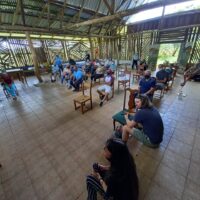 about deep trust, simple living, and just transition, members of interwoven climate-, water- and food justice movements in the country will share their stories about the complexity of Costa Rica’s current reality. Since the 1980s, the majority of political leaders have embraced neoliberal solutions–an export economy and narrative of upward mobility–that are grafted onto rooted traditions of small-scale farming, a safety net of social programs, and profound faith. Is the country that has emerged since the 1980s one that cultivates trust and authentic well-being? If not, what is being set into place instead, and by whom? Indigenous communities with lived experience of simplicity and generosity are providing concrete examples of paths towards just transition. What kind of systemic support do networks of people recovering tradition and creating new models need to thrive?
about deep trust, simple living, and just transition, members of interwoven climate-, water- and food justice movements in the country will share their stories about the complexity of Costa Rica’s current reality. Since the 1980s, the majority of political leaders have embraced neoliberal solutions–an export economy and narrative of upward mobility–that are grafted onto rooted traditions of small-scale farming, a safety net of social programs, and profound faith. Is the country that has emerged since the 1980s one that cultivates trust and authentic well-being? If not, what is being set into place instead, and by whom? Indigenous communities with lived experience of simplicity and generosity are providing concrete examples of paths towards just transition. What kind of systemic support do networks of people recovering tradition and creating new models need to thrive? One convener is the community of Longo Mai, founded in the 1980s as a haven for refugees fleeing violence in El Salvador. The country’s second largest employer, a subsidiary of Fresh Del Monte Produce, Inc.–one of the world’s largest suppliers of fresh and prepared produce–began at that time planting extensive fields of pineapple, adjacent. The community has become an island amidst pineapple and incubator of critical conversations about the heart, compassion, deep trust and sacrifice required in these times.
One convener is the community of Longo Mai, founded in the 1980s as a haven for refugees fleeing violence in El Salvador. The country’s second largest employer, a subsidiary of Fresh Del Monte Produce, Inc.–one of the world’s largest suppliers of fresh and prepared produce–began at that time planting extensive fields of pineapple, adjacent. The community has become an island amidst pineapple and incubator of critical conversations about the heart, compassion, deep trust and sacrifice required in these times.Session Slot
Tuesday October 12th 17:00-18:00 UTC
SESSION SPEAKER(S)
Maria Sulma Toledo Alas Clara Ramin Oscar Beita Madeline Kiser
SESSION DETAILS
Climate reparations are a key demand for the climate justice movement around the world. However, in the Global North these demands are not popular and almost always ignored. In this session, we will be talking about why climate reparations are central to climate justice and a key to building the kind of power we need for systems change. We will also discuss how the demand for reparations shows up in conceptions and campaigns for a Global Green New Deal
Session Slot
Tuesday October 12th 13:00-14:00 UTC
SESSION SPEAKER(S)
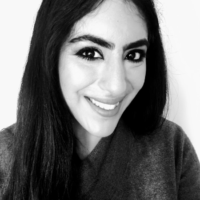 Harpreet Kaur Paul is a human rights lawyer, researcher and writer. She recently co-founded Tipping Point UK, and is a PhD candidate at the University of Warwick’s Law School.
Harpreet Kaur Paul is a human rights lawyer, researcher and writer. She recently co-founded Tipping Point UK, and is a PhD candidate at the University of Warwick’s Law School.
D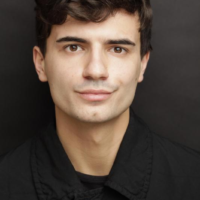 aniel Macmillen Voskoboynik is Co-Founder And Co-Editor at The World At 1C, based in Barcelona, Spain.
aniel Macmillen Voskoboynik is Co-Founder And Co-Editor at The World At 1C, based in Barcelona, Spain.
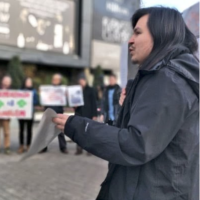 Sebastian Ordonez is the Senior International Programmes Officer (Latin America) at War on Want in London, UK.
Sebastian Ordonez is the Senior International Programmes Officer (Latin America) at War on Want in London, UK.
SESSION DETAILS
In response to concerns with Protected Areas as part of the proposed “30×30” policy framework, three foundations came together to write an open letter to the Convention on Biodiversity, naming the problematic track record of Protected Areas in forcibly removing indigenous and other marginalized groups from their homelands, tied to fortress conservation. This letter was written in solidarity with community and NGO partners and signed by 46 other foundations. It challenges the conservation industry paradigm and calls attention to the threats Protected Areas pose in terms of perpetuating further human rights violations and land grabs across the globe.
Taking a stand on policy issues alongside grantee partners is not something foundations typically do. There are risks associated with being seem as “speaking on behalf of” or otherwise interfering. There are also risks associated with the typical silence of foundation on issues that foundations fund. This webinar will explore these issues and concerns. The three foundations who led this effort will also offer their own particular intentions and perspectives as well as process around initiating and drafting this open letter. Specific stories about ongoing challenges with Protected Areas and other conservation initiatives within Indigenous territories will also be shared and the proposal to protect 80% of the Amazon by 2025, promoted by Amazonian Indigenous Peoples organizations and allies, will also be discussed.
Session Slot
Wednesday October 13th 16:00-17:00 UTC
SESSION SPEAKER(S)
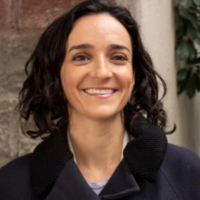 Laura Garcia, Executive Director Global Greengrants Fund
Laura Garcia, Executive Director Global Greengrants Fund
Laura is a Mexican feminist who has advocated for human rights, social justice, and civil society throughout her career. Before joining Global Greengrants, Laura served for seven years as the Executive Director of Fondo Semillas, a Mexican nonprofit organization that finances grassroots organizations to achieve gender equality. Laura has vast experience in grassroots philanthropy, human rights, and movements for social justice, and she has co-created networks to promote community philanthropy in the Global South. She holds a Master’s Degree in International Peace and Security, from King’s College, London. She currently serves on the boards of Oxfam Mexico, Justicia Transicional MX, El Día Después, and the Global Fund for Community Foundations.
Chivy Sok, Executive Director, Tikva Grassroots Fund
Chivy Sok, Executive Director of the Tikva Grassroots Empowerment Fund, is a long-time human rights educator, researcher, and trainer. Her work at Tikva Grassroots includes a diverse set of portfolios, including environmental justice, community-centered conservation, human rights, corporate accountability, and sustainable agriculture. The Fund supports organizations working to advance justice and sustainability in Africa, Latin America, and Asia. Chivy has worked on a number of human rights projects with different organizations during the last three decades. She has served on the Steering Committee of the Ginetta Sagan Fund of Amnesty International USA and co-founded the Devata Giving Circle, the first Cambodian American women philanthropic circle in the US. She is the former Program Director of Columbia University’s Center for the Study of Human Rights and former Deputy Director of the University of Iowa Center for Human Rights (UICHR). While at the UICHR, she was appointed as an Adjunct Lecturer at the University of Iowa School of Law where she co-taught an advanced research seminar on international human rights and child labor and also concurrently served as the Project Director of a multi-faceted initiative on global child labor under contract with the U.S. Department of Labor. Chivy completed her B.A. in Political Science at UC Santa Barbara and a Master of International Affairs degree from Columbia University School of International and Public Affairs.
Alejandro Argumedo, Program Director, Swift Foundation
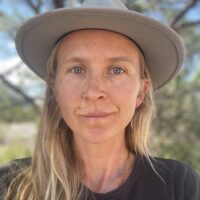 Moderator: Sonja Swift, Program Advisor, Swift Foundation
Moderator: Sonja Swift, Program Advisor, Swift Foundation
Sonja works as Program Advisor for Swift Foundation and also co-directs Windrose Fund of Common Counsel Foundation. She has consistently advocated for more accountability and coherency in the field of philanthropy and that funding go to organizations led by people with lived experience of the issues at hand, all the while working to facilitate those structural changes within. Writing is her artistic medium, both creative nonfiction and poetry. She serves on the boards of the Colorado Plateau Foundation, Community Agroecology Network and Oakland Institute.
Session Details
A momentous and radical shift is taking place across Palestine–a unified Palestinian uprising, in which voices and movements previously sidelined in the liberation struggle are taking center stage to set the mandate for an intersectional grassroots-led anti-colonial social justice movement. Join voices from Palestinian community-led participatory grantmakers Dalia Association and Rawa Fund, as well as movement funder Grassroots International, to learn about the impact international funding has had on shrinking Palestinian civic space, community philanthropy, de-development in Gaza, and further fragmenting Palestinians in line with Israel’s colonial and apartheid regime; and to brainstorm together ways that the EDGE community can de-exceptionalize Palestine in progressive spheres, build intersectional global solidarity, and strengthen the current momentum to change the status quo. This session will include a brief introductory presentation and plenty of opportunities for the audience to participate by sharing experiences, knowledge, questions, and challenges.
Session Times
Monday October 11th 16:00-17:00 UTC
Session Speaker(s)
Rasha Sansur, Dalia Association
Born in Palestine, Rasha Sansur passionately believes in the values of the #ShiftThePower movement. She has been the Communications and Resource Mobilization Officer at the Dalia Association, and since 2018 has also provided volunteer communications support to the Foundations for Peace network. Part of her work involves advocating for a shift in developmental priorities, and demand that Palestinians have a say in their development, and control over their own resources, using community philanthropy as a model. She recently supported the Global Fund For Community Foundations in developing a platform for the #ShiftThePower movement. She graduated with honors from Birzeit University in 2011 majoring in Journalism with a minor in Sociology. In 2015, she earned a master’s degree in Communication and Development, from the Center for International studies at Ohio University through a MEROL Scholarship.
Soheir Asaad is the advocacy and communications team member of Rawa.
She is a political and feminist Palestinian organizer and a human rights advocate. Soheir received a Masters degree in international human rights law from the University of Notre Dame (US).
She is also the coordinator of the Palestine Feminist Anti-Violence Movement pilot of Global Fund for Women.
Colleen Jankovic has been the Development & Finance team member with Rawa Fund since 2016, where she works to mobilize resources that shift power to Palestinian grassroots communities. She received a PhD in Critical & Cultural Studies from the University of Pittsburgh, where she focused on Palestinian feminist and queer cinema and the visual culture of Zionism and Israeli settler colonialism. She recently completed the EDGE Funders Alliance Global Engagement Lab program.
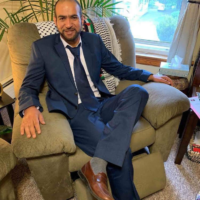 Ayman Nijim, Grassroots Online
Ayman Nijim, Grassroots Online
Ayman Nijim is the Solidarity Program Officer for the Middle East. Ayman is originally from Gaza, where he has worked at various international and community-based organizations with children who have experienced war and trauma. Ayman holds a Master’s in Intercultural Service, Leadership and Management from the School of International Training in Vermont. He has also received diplomas from the Dispute Resolution Center, the Conflict Center, and the International Trauma Healing Program, all in Olympia, Washington. Recently, Ayman was program director at Maine Immigrant and Refugee Services and executive director of Common Ground, and he currently serves on the Advisory Board of the Gaza Community Mental Health Foundation.
Session Details
Coming soon
Session Slot
Tuesday October 12th 16:00-17:00 UTC
Session Speakers
Melina Laboucan Massimo, Indigenous Climate Action
Melina Laboucan-Massimo has worked on climate justice, Indigenous sovereignty and women’s rights for over 20 years. Melina is Lubicon Cree from Northern Alberta, Canada. She is the Founder of Sacred Earth Solar and co-founder and Healing Justice Director at Indigenous Climate Action. Melina is the inaugural Fellow at the David Suzuki Foundation where her research focused on Climate Change, Indigenous Knowledge and Renewable Energy. She is the Host of a new TV series called Power to the People which profiles renewable energy in Indigenous communities.
Melina holds a Master’s degree in Indigenous Governance at the University of Victoria with a focus on Renewable Energy. As a part of her master’s thesis Melina implemented a 20.8 kW solar project in her home community of Little Buffalo which powers the health centre in the heart of the tar sands. Melina has studied, campaigned and worked in Brazil, Australia, Mexico, Canada and across Europe focusing on resource extraction, climate change impacts, media literacy and Indigenous rights & responsibilities.
In 2021, Melina was named one of the 26 Climate Champions in Canada by the Canada Climate Law Initiative. She has also been recognized for her work throughout the years, being profiled and named as a social & climate justice influencer in Global Citizen, Elle Magazine, Chatelaine, Flare, CBC, 350.org and Refinery29. She received the Canadian Eco-Hero Award in 2019 by Planet in Focus.
Melina has campaigned to build brighter futures alongside icons including Jane Fonda, David Suzuki, Bill McKibben and Naomi Klein. She has been invited to speak before hundreds of audiences over the years including in the US Congress, the Harvard Law Forum, in British Parliament and numerous international organizations like Amnesty International while campaigning globally for climate justice.
Before Melina’s climate justice work, she worked on social justice since she was a teenager focusing on media literacy in print & film making at the Indigenous Media Arts Group and Redwire Native Media Society. Her extensive advocacy is deeply rooted in her first-hand experience as an Indigenous woman being on a blockade in her community’s struggle to protect their homelands at the tender age of 7 years old. The impacts of the oil tar sands on her home community compelled her to be a strong voice from a young age. It is from her love for her community and for Mother Earth that she draws her convictions to stand up for environmental rights, climate justice, and Indigenous-led movement building.
Melina also works on the issue of Murdered and Missing Indigenous Women after the suspicious death of her sister Bella whose case still remains unsolved. Melina believes that healing the land and healing the people go hand in hand which is why Healing Justice is so crucial in the environmental and climate justice movement.
Ms. Gabriel was well-known to the public when she was chosen by the People of the Longhouse and her community of Kanehsatà:ke to be their spokesperson during the 1990 “Oka” Crisis; to protect the Pines from the expansion of a 9 hole golf course in “Oka” and the removal of Kanien’kehá:ka ancestors from their burial grounds.
Ms. Gabriel has a Bachelor of Fine Arts degree with a Major in Studio Art from Concordia University where she graduated in May 1990.
She is presently an active board member of Kontinón:stats – Mohawk Language Custodian Association and is as Steering Committee member with Indigenous Climate Action.
In 2004, Ellen Gabriel was elected president of the Quebec Native Women’s Association a position which she held for 6 ½ years, until December 2010.
She has been an Indigenous human rights and environmental activist since 1990 and continues to advocate for the rights of Indigenous peoples: in particular Indigenous peoples’ rights to self-determination, cultural and language rights, the issue of violence against Indigenous women and climate change.
Awards: In 2005 Ms. Gabriel received the Golden Eagle Award from the Native Women’s Association of Canada; 2008 International Women’s Day Award from the Barreau du Québec/Québec Bar Association, and as well in August 2008 Ms. Gabriel was the recipient of the Indigenous Women’s Initiative “Jigonsaseh Women of Peace Award” for her advocacy work and a recipient of the Senate of Canada’s 150 anniversary Medal for her advocacy for Indigenous Peoples rights.
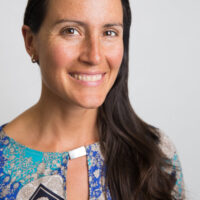 Pearl Gottschalk, Healing Justice
Pearl Gottschalk, Healing Justice
Pearl Praise Gottschalk (Lujan) is of Ukranian and Apache/Raramuri descent and grew up in Cree/Anishinabe territory (Winnipeg Manitoba). She has been a philanthropist/activist in indigenous front line work for over a decade with a particular focus on Indigenous Led funding. She is a part of the Healing Justice team at Indigenous Climate Action as well as the Program Advisor to the Indigenous Women’s Flow Fund at The Kindle Project and Development Assistant to the Native Land Campaign at The Cultural Conservancy. She previously worked as the Charitable Giving Manager at Lush Cosmetics and the Refugee/Immigrant Funder for the Province of Manitoba. She holds a Masters in International Dispute Resolution and a Bachelors in International Development, and has traveled to 53 countries. Her extensive international work in development aid globally was her first experience in navigating deep complex front lines traumatic work for which there was no system of healing or self care for aid workers. That experience, combined with surviving a natural disaster in 2015, began a deepening of her own healing journey which led to a rich, first hand understanding of the importance and need for healing justice work.
She currently lives, works and plays on the ancestral homelands of the Syilx People of the Okanagan Nation in Penticton, BC. When she’s not hiking up a mountain or paddling a lake, you can find her mountain biking, playing ukulele or salsa dancing. Most of all, her greatest joy in life is her deep connection to the wild earth and protecting this beautiful home she has been given.
Session Details
Most flights were grounded due to Covid-19, posing enormous difficulties for workers in the sector. Yet, in order to effectively counter the climate crisis, aviation and mass-tourism need to be limited in the long-term. How do we envision a transition process that cares for the climate and the people whose livelihoods depend on aviation and tourism? How can this be done together with workers and trade unions, instead of against them? And are there inspiring examples?
Session Slot
Wednesday October 13 12:00-13:00 UTC
Session Speaker(s)
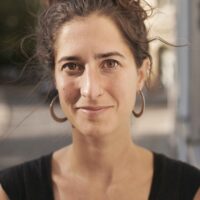 Magdalena Heuwieser, DE, Stay Grounded
Magdalena Heuwieser, DE, Stay Grounded
Magdalena Heuwieser is co-founder of the global network Stay Grounded, representing 170 member organisations in their efforts to reduce aviation in a just way. She (co-)authored publications on neo-colonial climate measures, the “imperial mode of living” and on a just transition of aviation. She lives in a community in the German countryside.
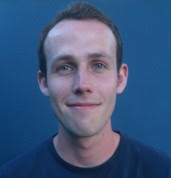 Finlay Asher is co-founder of ‘Safe Landing’ – a group for climate-concerned aviation workers: pilots, flight crew, engineers, airline and airport employees. He is a Scottish Mechanical Engineer with extensive aerospace experience: designing future aircraft engine systems with Rolls-Royce and working on various Airbus/Boeing future aircraft. He also runs a YouTube channel called ‘Green Sky Thinking’ which counters aviation industry greenwash.
Finlay Asher is co-founder of ‘Safe Landing’ – a group for climate-concerned aviation workers: pilots, flight crew, engineers, airline and airport employees. He is a Scottish Mechanical Engineer with extensive aerospace experience: designing future aircraft engine systems with Rolls-Royce and working on various Airbus/Boeing future aircraft. He also runs a YouTube channel called ‘Green Sky Thinking’ which counters aviation industry greenwash.
Session Details
Strengthen inclusive and just conservation of land and other natural resources facilitating solutions tailored to the context, conceived and run by Indigenous People.
Objectives:
a) Enhance and strengthen capacity of existing grassroots Indigenous movements to claim and secure their communal land rights and address historical land injustices and address power imbalance in conservation. b) Strengthen and sustain values that embody inclusive conservation through networking for mutual beneficial learning, sharing and empowerment. Inclusive conservation initiatives depend on the strength of the communities themselves c) Enhance trust, strengthen voice and agency towards strong local institutions governing conserved territories, while leveraging on existing platforms to self-evaluate and strengthen the quality of their governance (e.g., accountability, effectiveness) d) Improve implementation of policies that recognize indigenous peoples and local communities as legal actors possessing collective rights.
Session Slot
Wednesday October 13 12:00-13:00 UTC
Session Speakers
Ole Kaunga, Charis Enns, Ramson Karmushu
Session Details
Only a fraction of philanthropies currently invest in independent newsrooms as a means to drive social change. However, journalism plays a key role in shaping public opinion and amplifying local issues with a global relevance: Social movements such as Black Lives Matter, India’s Farmers’ Protest or Nigeria’s EndSARS-protests were fuelled by local journalists who covered these movements at their inception- not as detached observers working for legacy media outlets, but as local reporters invested in documenting and amplifying stories of social change.
Inclusive journalism projects such as Hostwriter’s feminist cross-border newsroom “Unbias the News” are examples of a new generation of journalism entrepeneurs who feel part of a global movement. They actively fight for a more equitable and inclusive world of journalism as a means to enable social change through powerful storytelling: Underrepresented reporters are enabled to tell their communities’ stories, rather than helping foreign correspondents as local “fixers”. Underserved audiences regain trust in journalism by seeing stories that affect their communities covered accurately and empathetically. Solution-oriented reporting leads to actionable insights that help our audience hold the powerful accountable, and leads to actual real-life improvements.
In this panel, we will explore the mission of “Unbias the News” and learn from Luminate’s experiences in funding this type of journalism. We will then discuss jointly the opportunity for philanthropy to support inclusive journalism projects as a means for sytemic change.
Session Slot
Tuesday October 12th 12:00-13:00 UTC
Session Speakers
Mercy Abang, Unbias the News Nkirote Koome, Luminate Group Maartje Eigeman, Democracy and Media Foundation
Session Details
What choices can funders make to ensure our work is more equitable, imaginative, feasible, and joyful? Join a simultaneous conference discussion being hosted by Healing Solidarity (healingsolidarity.org) at this time focused on how funders are #MakingDifferentChoices to ensure resources and power are flowing, rather than being controlled. Fanta Toure-Puri of Girls First Fund and Zanele Sibanda of Women’s Funds Collaborative and others will share their insights about what steps funders can make to improve the quality of funding relationships and get serious about moving more unrestricted money in more disbursed ways than ever before. This event is designed for sustained, thoughtful group inquiry and deep, active listening – a space that is conversational rather than presentational. We hope you will join in!
Session Slot
Wednesday October 13th 16:00-17:00 UTC
Session Speakers
Jennifer Lentfer, Fanta Toure-Puri, Zanele Sibanda
Session Details
WeMove Europe is a 6-year old digital community of over a million people across Europe who take action to transform Europe in the name of people and planet. Our strategy is called ‘People Power to Transform Europe’ and its ultimately about making digital campaigning meaningful, engaging and impactful, combining digital with offline campaigning, and going beyond just communicating and mobilising to organising people over time. We would love to share ideas and ask questions about how we are doing that, how we could get better at doing that, what we could learn from others and vice versa. Ultimately there is so much potential to transform Europe and the world through widening, connecting and deepening people power. We promise to honestly share the learnings, the weight of the challenges of implementation, as well as the hope ahead.
Session Slot
Tuesday October 12th 12:00-13:00 UTC
Session Speakers
Laura Sullivan, WeMove Europe
Laura is the Executive Director of WeMove Europe, a digital campaigning organisation that connects up activism in Europe towards systemic change. She has spent the last 20 years campaigning for a more just, humane and sustainable Europe with WeMove Europe, ActionAid International, Concord and before that from inside the European Parliament. She and others still have lots of work to do!
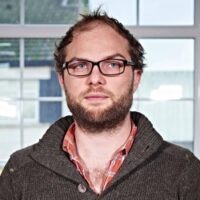 Richard Hawkins, Public Interest Research Center
Richard Hawkins, Public Interest Research Center
Rich was part of the project team running Framing Climate Justice, a movement-building narrative project that ran in the UK in 2019/2020. He is design lead at PIRC, overseeing the production of their narrative and framing resources; and has spent over a decade exploring how to ensure strategic communications work in civil society is democratic, systemic and inclusive.
Thomas Maisey, WeMove
Session Details
Strategic litigation has helped drive change in the fight for climate justice, accountability for gross human rights violations, and the campaign for marriage equality. What are the opportunities for bringing about structural change through the courts in the racial, social and economic justice fields? Where will strategic litigation for equity have the greatest impact and what support do movements need to seize this opportunity?
Grassroots organisations and movements have been pushing for change in the areas of racial, social and economic justice for decades, using mostly advocacy, campaigning and policy work. However, the courts can also act as important levers for change: judicial decisions helped fuel abolitionism in Great Britain as far back as the 18th century and the courts have continued to hand down seminal cases on anti-racism, LGBTQI rights and disability rights. However, judicial systems are becoming more closed off to communities and grassroots movements,, particularly in Europe. Legal fees are high, processes are complex and the legal profession continues to inadequately reflect the society we live in. This means that, in civil society spaces, litigation is pursued by well-resourced NGOs and lawyers who are often not well-connected with those most in need of access to justice and who have urgent issues to place on the judicial agenda.
This session will help shape the development of a new initiative, Systemic Justice (https://systemicjustice.ngo), that seeks to improve access to justice for grassroots movements and organisations by building their power to use strategic litigation as a tool for change. After a brief sketch of the current landscape and opportunities, we’ll jointly look at three main questions:
1. Where would strategic litigation have been helpful or needed in past efforts to advance racial, social and economic justice and how does this point the way for future efforts? 2. What needs to happen to make strategic litigation more accessible to the field? 3. What kinds of change are possible if we fully leverage the power available to us through the courts?
We very much value your collective brainpower as we are thinking through our approach. Please join the conversation and bring your insights and experience as a funder of racial, social and economic justice work, as an activist, or any other context so we can harness as much collective wisdom and develop a meaningful addition to the social justice ecosystem.
Session Slot
Wednesday October 13 12:00-13:00 UTC
Session Speaker(s)
Nani Jansen Reventlow
Session Details
In this moment of multiplying global crises, we have an important opportunity to deeply re-imagine our world. At the same time, across regions, the rising right – including fundamentalisms and fascisms – have significantly entrenched their power, and many have taken advantage of the pandemic and economic crisis to consolidate deeper authoritarianism. Feminist movements have long been at the forefront in identifying and analysing ‘warning signs’ of fundamentalisms and fascisms, which are rooted in and informed by patriarchy and heteronormativity. Along with other progressive movements worldwide, feminists have also been at the leading edge of developing and growing transformative alternatives and forms of organizing. In this session, we hope to create a conversation on the work of feminist movements to disrupt and challenge the rising right in multiple regions worldwide; on transnational solidarity and network-building; and on how we can collectively address roadblocks to achieving our transformative visions. The session will also present a new initiative, Noor, that seeks to obstruct far right agendas and advance transformative change.
Session Slot
Wednesday October 13 12:00-13:00 UTC
Session Speakers
Nana Abuelsoud is the Programmatic and Advocacy Lead in RESURJ, a global south-led feminist alliance of younger feminists. She is a feminist researcher based in Cairo motivated by her interest in knowledge production and feminist movement building. Previously, she worked as a sexual and reproductive rights researcher at the Egyptian Initiative for Personal Rights (EIPR), and was a core member of Ikhtyar Feminist Collective between 2016 and 2020. Nana is a fellow of the Transformative Research Arab-Families Working Group.
Fahima Hashim founded and served as the director for Salmmah Women’s Resource Centre in Khartoum, before it was forced closed by the Sudan government. A feminist activist for over 25 years, dedicated to promoting radical change for women and their place in society, she has a focus on feminist movement building, action research and training. She is a Board member of Nazra for Feminist Studies, and an advisory Board member for the Doria Feminist Fund, the first feminist fund for women in the MENA region.
Cristina “Tinay” Palabay is the Secretary General of Karapatan, a Philippines-based alliance working to promote and protect human rights in the Philippines. She is a Regional Council Member of the Asia Pacific Forum on Women, Law and Development, and a co-convenor of Tanggol Baji, a national network of women human rights defenders. She was a founder, and previously the Secretary General, of the Gabriela Women’s Party, and is a Board Member of Kapederasyon, a national LGBT organization.
Naureen Shameem is a feminist activist with roots in Pakistan, with a focus on investigating and challenging the global far right, and transnational organizing. She is the founder of Noor, a new global feminist initiative. Naureen is also a director of the transnational grassroots solidarity network Women Living Under Muslim Laws. She previously led the Advancing Universal Rights and Justice initiative at AWID, and coordinated the Observatory on the Universality of Rights (OURs), a collaborative project countering fundamentalisms and fascisms.
Session Details
Flow Funding is a programme that shares power with experienced activists and visionary leaders who choose from intuition how philanthropic funds should be invested. This approach aims to diminish bureaucracy while decentralising decision making regarding the use of resources, inspiring more wealth holders to value the power of story and human connections.
Session Slot
Tuesday October 12th 12:00-13:00 UTC
Session Speakers
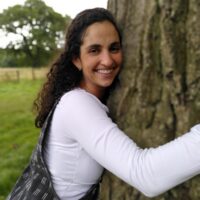 Renata Minerbo, Be the Earth Foundation
Renata Minerbo, Be the Earth Foundation
Renata is passionate about nature and collaboration. Previously as a social entrepreneur in Brazil, she accumulated a lot of experience in engaging and empowering diverse grassroots communities while transforming collective spaces with participatory methods with her company Acupuntura Urbana. For 11 years she worked on the ground and trained other changemakers within the Warriors Without Weapons international programme, so they could use these participatory tools to lead the change in their own environments.
Renata met her life partner and left the country in 2018. She’s one of the trustees and leads the Philanthropy arm of Be The Earth Foundation. Designing and running programmes, as well as finding new relevant partnerships, she recently gave birth and is rediscovering her new self as a mother, funder and activist for a world that nurtures all beings.
Session Details
A discussion space on what we understand by “solidarity”, the different forms of international solidarity, and how international allies (and funders) can generate justice-centred collaborations which are conscious of the power dynamics embedded within them.
Session Slot
Tuesday October 12th 13:00-14:00 UTC
Session Speakers
I studied Sociology at the Universidad de San Simón in Cochabamba. Since 2000 I have been an activist in Bolivian youth organizations in support of social movements, particularly in relation to water, gas, the coca leaf and natural resources. Since 2005 I have been more involved in autonomous feminist groups and spaces, and recently more from a class and decolonizing perspective. I worked at the Democracy Center from 2007 to 2020, when we founded TerraJusta, where I hold the position of Director. My work also focuses on relationships and direct communication with social organizations and allies of affected communities, mainly in the southern region of Peru.
I started working for the Democracy Center in 2011, and am very happy to still be working with my colleagues now as part of TerraJusta. I am based in Brighton, UK. I contribute on communications and fundraising at TerraJusta as well as working in collaboration with our UK allies.
I have been involved with social organizations since 2002. I worked at The Democracy Center from 2006 to 2020, year in which when we founded TerraJusta. I currently work in the area of communications, investigation of socio-environmental conflicts in the territories and international campaigns, connecting the work of local organizations and affected communities with international networks which we are part. I spent a year (2018-2019) living in Dublin and London and I have traveled through several Latin American countries in contact with social organizations. I have studies in Economics, Social Psychology and Communication. @AOrellanaLopez
Session Details
Do you share a strong feeling of hope when you see how the way communities manage land and water can be key to a fair and sustainable world? Are you curious to learn and exchange with us on how money flows can strengthen their practices? This session aims to bring two worlds together which are often seen as separate: the financial system and the field of sustainable, community-led land and water management practices. Large amounts of money oftentimes flow to business-as-usual practices, while truly sustainable practices lack financial means. The flows of money concerns both public as private means, while both are necessary considering the environmental challenges we are facing. During the session, we will take community-led sustainable land and water management practices as a starting point to zoom in on inspiring examples of how financial flows can be designed in order to support these practices. Together with practicitioners and experts Lubi Bogantes (International Analog Forestry Network), Eva Rehse and Jasleen Mahal (Global Greengrants Fund), and Stefan Schuller (Both ENDS), a conversation will be held to exchange about roadmaps towards a financial system in which truly sustainable practices on the ground can flourish.
Session Times
Monday October 11th 16:00-17:00 UTC
Session Speakers
Lubi Bogantes, International Analog Forestry Network (IAFN)
Lubica Bogantes is the Coordinator of Capacity Building programs at the International Analog Forestry Network since 2017.
With legal background, Lubi has 10 years experience working in international cooperation in projects focused on promoting forest restoration, environmental protection and local climate change initiatives through the women’s rights lens. Currently, she is coordinating activities at the IAFN as part of the Global Alliance for Green and Gender Action (GAGGA Alliance) program and her vision is to show that forest restoration and analog forestry are successful and sustainable only when women play a central role and their rights are respected.
Eva Rehse, Global Greengrants Fund
Eva Rehse is the Executive Director of Global Greengrants Fund UK. With a background in human rights, civil society development and social action, Eva brings over a decade of experience in project management and resource mobilisation. Previously, Eva worked for Amnesty International as an International Projects Advisor, and for CIVICUS. Eva also worked with the Scottish Biodiversity Forum where she was part of creating Scotland’s first biodiversity strategy. Eva has a M.A. from Bonn University in Political Science and Sociology. She is a member of the Alliance Magazine Editorial Advisory Board, and an alumni of the Oak Foundation and Resource Alliance’s Future Leaders Programme.
Jasleen Mahal, Global Greengrants Fund
Karin van Boxtel, Both ENDS
Stefan Schuller, Both ENDS
Stefan is programme and policy officer sustainable land use at Both ENDS. He coordinates projects on agroecology, Inclusive Land Governance and Farmer-Managed Natural Regeneration in African countries, working closely with civil society and movements, while at the same time engaging in policy processes in the Netherlands related to agroecology
Having worked and lived with farmers in different parts of the world, Stefan has seen the struggles that many of them face due to external threats like climate change, population growth, trade liberalization and the corporatization of agriculture. Although these experiences were frightening, I was left with a positive feeling seeing the dedication and passion that many of them have for becoming their own agents of change.
Maaike Hendriks, Both ENDS
Stefanos Galountzis combines a background from public health and psychology, with 15 years of professional experience in humanitarian emergencies and community development programs. Through his work as an advisor for Int. organisation (i.e. Red Cross, Oxfam, SCI, IRC) he has experienced some of the world’s worst expressions of armed conflict, migration and extreme poverty.
Being a direct witness to the devastation that discrimination and inequality brings in human lives, especially in the lives of children, is what drives Stefanos life commitment to Unity in Equality and to the development of Ethos. His work and passion for social transition to a just and equitable world brought him in 2018 to join the FundAction community where he supports with fundraising, community building and since June as nominated member in the facilitation group.
Session Details
A conversation with co-founders of Resource Justice, Resource Transformation and the Good Ancestor Movement, where we will be interrogating the tension points of organising rich people to redistribute to social justice movements.
Session Speakers
Stephanie Brobbey, Good Ancestor Movement Renee Paula Horster, Resource Transformation Leonie Taylor, Resource Justice Kristina Johansson, Resource Justice
Session Details
Although climate finance has increased considerably in recent years, it is still not enough to ensure the local leadership in climate adaptation needed for a just transition. Climate finance is currently not reaching local solutions in the global South. Without it, vulnerable communities and ecosystems will be most affected as the implementation of critical solutions is postponed. At the same time, many initiatives have recently emerged to strengthen capacities and improve conditions for local communities to define their own needs and access climate finance. However, there is a gap between the science-based climate rationale that has been guiding climate finance and the preparedness of local communities to translate their needs into actual financeable solutions. The philanthropic sector has been increasingly involved in the climate agenda and is uniquely positioned to take the necessary risks to unlock climate finance to reach the local community level. This session aims to spark an insightful conversation on how to promote systemic change in funding local solutions. We will hear insights directly from local communities and reflect on ways to develop alternatives and foster collaborative mechanisms that are more flexible, risk-tolerant, and designed from the perspective of local communities. In addition, the conversation will address system change by exploring how alternative climate mechanisms can inform existing ones to ensure they address local solutions.
Session Slot
Wednesday October 13 12:00-13:00 UTC
Session Speakers
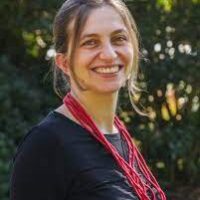 Paula Ellinger – Climate Action Programme Manager at Fundación Avina
Paula Ellinger – Climate Action Programme Manager at Fundación Avina
Paula is senior manager, researcher and facilitator of climate change governance and solutions. During over 10 years she has contributed to promote sustainability strategies in Latin America, with an emphasis in capacity building and governance. Paula has a vast experience in launching innovative initiatives to build capacities on climate action, collaborated with governments in implementing Green Climate Fund readiness projects, engaged with researchers and civil society in NDC implementation analysis, and managed projects to connect climate science and policy. She has a solid experience leading multi-stakeholder and transnational projects and following closely global climate governance issues and builds bridges between local, national, regional and global arenas. Member of the Expert Peer Review Group of UNFCCC’s climate champions campaign – Race to Zero. She recently launched an initiative to address the connection between childhood and sustainability. Holds a BA in International Relations and a MA in Development Studies, as well as training in facilitation, design thinking and cognitive psychology.
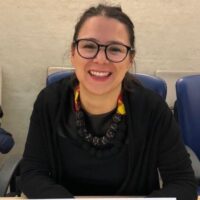 Valeria Scorza – Executive Director of Avina Americas and Director of Partnerships at Fundación Avina
Valeria Scorza – Executive Director of Avina Americas and Director of Partnerships at Fundación Avina
Previous to her current role, she held the role of Programme Director coordinating the regional strategies of the Migration and Political Innovation Programmes. Prior to joining Avina in 2015, Valeria was deputy director for Proyecto de Derechos Económicos, Sociales y Culturales (ProDESC), a non-governmental organization that promotes labour, land, and territory rights in Latin America. She has also worked at the International Center for Transitional Justice and Amnesty International in New York City, and participated in the United Nations Mission in Liberia (UNMIL). Valeria holds a BA Degree in Political Science and Public Administration from the Universidad Iberoamericana in Mexico City and a master’s degree in International Relations from Columbia University in New York City. She serves on the International Advisory Board of the Business and Human Rights Center and Boards of the Human Rights & Business Award, Ethos Laboratorio de Políticas Públicas and Equis Justicia para las Mujeres. She is member of the Steering Committee of the Americas at Edge Funders.
Session Details
The Apthapi Jopueti Fund is a feminist, autonomous, secular, transparent and horizontal women’s Fund that mobilizes resources to enhance the political, economic, cultural and social action of urban, rural, indigenous women’s organizations, feminist collectives and lesbian women’s groups , bisexual, trans, intersex, queer and sexual dissidents (LBTIQ +), in order to influence the transformation of patriarchal, capitalist and colonial society. From our point of view, we want to present and discuss the Bolivian context, the reality of women and the anti-extractivist and feminist struggles in the midst of a climate crisis related to forest fires and the growth of the agricultural frontier, which threatens the indigenous territories and protected areas of the country, increasing the vulnerability of women, in addition to generate contamination of water sources, damage to the health of comunities and violates the right to food sovereignty. The reality of Bolivia regarding these issues is normally unknown, which is why it seems important to discuss the consequences of these events specially for women, taking into account that these problems are shared by the entire region.
Session Recording
Session Speakers
M.Sc. Fabiola Yesmin Aparicio Avichacra studied Political Science and Public Management at the San Andrés University (La Paz – Bolivia). She has a master’s degree in Philosophy and Political Science in the Postgraduate Program in Development Sciences (CIDES – UMSA) and completed her Master’s studies in International Relations at Loughborough University (UK).
She has worked as a research assistant, associate program officer and project coordinator in several international organizations based in Bolivia, dedicated his career to develop projects for the strengthening of democracy and empowerment of women’s and youth organizations. She is currently the Fundraising and Mobilization Coordinator of the Bolivian Women’s Fund, a feminist fund that redistributes resources to women’s organizations for social transformation and the recognition of women’s rights.
Lola Gutiérrez León – Executive director Fondo de Mujeres Bolivia
Sociologist by profession with a Master’s degree in Social Sciences, focused in Local and Territorial Development, from the Latin American Faculty of Social Sciences (FLACSO) in Ecuador. She has a Specialization in Enforceability and Justiciability of Human Rights from the Universidad Andina Simón Bolívar in Bolivia, among other courses.
She has been working for the last eleven years doing social research in areas related to violence, feminism, gender, human rights and public policy. She worked for seven years in UNICEF Bolivia and one year in the UNICEF Regional Office in Panama, among other jobs.
Session Details
Antay is a trans singer-songwriter, composer and musician who shares his songs from his honest and free voice, with a vibrant and unique sound.
La Mamba is an Afro-queer singer-songwriter who is committed to using the arts to communicate, with their music they seek to make their community visible, share information and positive vibes to advance collectively.
Eme is a proudly trans singer and songwriter by family lineage. He bets on music, collaborative creation and cultural self-sufficency for resistance
Session Slot
Monday October 11th 17:00-18:00 UTC
Session Speakers
Eme , La Mamba, Antay
Session Details
Jamie Fuxx is a singing-dancing-cheeky heart throb that’ll grab the attention of your hot date (be warned). Using a combo of live singing, dancing and lip syncing over creative mixes you’re guaranteed to walk entertained.
Session Slot
Tuesday October 12th 17:00-18:00 UTC
Session Speakers
Jamie Fuxx
Session Details
coming soon
Session Slot
Wednesday October 13th 17:00-18:00 UTC
Session Speakers
Session Details
Fiscal sponsors and similar organizations that exist between funders and implementers provide a valuable service, helping navigate organizational and legal complexities, and ensuring projects get the resources they need to do what they do best. However, by the nature of the services they provide, and combined with other late stage capitalism and philanthropy trends, such as the gig economy, eroding labour rights, and one-year project-only funding cycles, these fiscal sponsors can end up having too much power, and end up in a de facto gatekeeper position. In this session we will start by unpacking this analysis, and then suggest a framework for how a responsible, ethical and community centered fiscal sponsorship solution might look like.
Session Slot
Wednesday October 13th, 2021
Session Speakers
Kristina Klein, Center for the Cultivation of Technology
 Tara Tarakiyee, Center for the Cultivation of Technology
Tara Tarakiyee, Center for the Cultivation of Technology
Tara is a technologist working with the Center for the Cultivation of Technology (CCT) on supporting FOSS projects with mentorship, organizational health, fiscal sponsorship and fundraising.
They have helped manage and incubate projects providing access to and security on the internet, led advocacy campaigns against online censorship, and worked on research mapping the infrastructure, legislation and policy aspects of censorship and surveillance.
They have previously worked with the Jordan Open Source Association (JOSA), the Association for Progressive Communications (APC), and the Open Technology Fund (OTF).
KEYNOTE SPEAKERS
- Leilani Fahra
- Galina Angarova
- Nani Jansen Reventlow
- Ashish Kothari
- Dr. Myrna Cunningham
- Elsa Nury Martinez Silva
- Moukhtar Kocache
- Poonam Joshi
- Carmen Dupont
- Selmin Çalışkan
- Rukia Lumumba
- Rose Longhurst
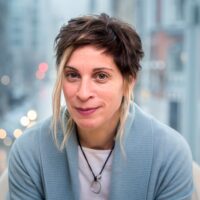 Leilani Farha is the former UN Special Rapporteur on the Right to Housing and Global Director of The Shift. Her work is animated by the principle that housing is a social good, not a commodity. Leilani has helped develop global human rights standards on the right to housing, including through her topical reports on homelessness, the financialization of housing, informal settlements, rights-based housing strategies, and the first UN Guidelines for the implementation of the right to housing. She is the central character in the documentary PUSH regarding the financialization of housing, screening around the world. Leilani Launched The Shift in 2017 with the UN Office of the High Commissioner for Human Rights and United Cities and Local Government.
Leilani Farha is the former UN Special Rapporteur on the Right to Housing and Global Director of The Shift. Her work is animated by the principle that housing is a social good, not a commodity. Leilani has helped develop global human rights standards on the right to housing, including through her topical reports on homelessness, the financialization of housing, informal settlements, rights-based housing strategies, and the first UN Guidelines for the implementation of the right to housing. She is the central character in the documentary PUSH regarding the financialization of housing, screening around the world. Leilani Launched The Shift in 2017 with the UN Office of the High Commissioner for Human Rights and United Cities and Local Government.
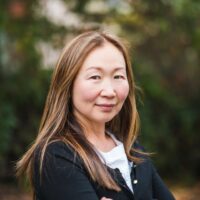 Galina Angarova is a representative of the Ekhirit nation of the Buryat Peoples, a Russian Indigenous group. She was born and raised in a traditional community close to the largest freshwater lake in the world, Lake Baikal in Siberia. Before joining Cultural Survival, Galina worked in local and global advocacy organizing direct actions and campaigns against large natural resource extraction projects including oil and gas development, mining, and hydro-dam development in Siberia and the Russian Far East. Thereafter, she served as a representative of the Indigenous Peoples’ Major Group at the United Nations on issues of Sustainable Development Goals and the Post-2015 Development Agenda. Furthermore, Galina led a team of Indigenous experts to represent the Indigenous Peoples constituency to the UN Framework Convention on Climate Change’s Green Climate Fund. Galina served as a policy and communications advisor for Tebtebba Foundation, and later transitioned to working as a program officer for the Swift Foundation. There, she managed a portfolio of 75 grantee partners in British Columbia, Canada, regions of the Amazon and the Andes in South America, and parts of the United States and Africa. Her focus centered on funding Indigenous-led organizations and reversing the Western-centric paradigm of philanthropy through building relationships and trust with grant partners and centering Indigenous values and local knowledge. Galina received an Edmund S. Muskie Graduate Fellowship from the U.S. Department of State to complete her Master’s Degree in Public Administration from the University of New Mexico in 2002. For over seven years she served on the board of International Funders of Indigenous Peoples (IFIP), the only global donor affinity group dedicated to Indigenous Peoples issues worldwide, whose work is based on the four Rs of Indigenous Philanthropy: Respect, Reciprocity, Responsibility and Relationships. In 2019, Galina brought her wealth of experience and joined Cultural Survival as the new Executive Director.
Galina Angarova is a representative of the Ekhirit nation of the Buryat Peoples, a Russian Indigenous group. She was born and raised in a traditional community close to the largest freshwater lake in the world, Lake Baikal in Siberia. Before joining Cultural Survival, Galina worked in local and global advocacy organizing direct actions and campaigns against large natural resource extraction projects including oil and gas development, mining, and hydro-dam development in Siberia and the Russian Far East. Thereafter, she served as a representative of the Indigenous Peoples’ Major Group at the United Nations on issues of Sustainable Development Goals and the Post-2015 Development Agenda. Furthermore, Galina led a team of Indigenous experts to represent the Indigenous Peoples constituency to the UN Framework Convention on Climate Change’s Green Climate Fund. Galina served as a policy and communications advisor for Tebtebba Foundation, and later transitioned to working as a program officer for the Swift Foundation. There, she managed a portfolio of 75 grantee partners in British Columbia, Canada, regions of the Amazon and the Andes in South America, and parts of the United States and Africa. Her focus centered on funding Indigenous-led organizations and reversing the Western-centric paradigm of philanthropy through building relationships and trust with grant partners and centering Indigenous values and local knowledge. Galina received an Edmund S. Muskie Graduate Fellowship from the U.S. Department of State to complete her Master’s Degree in Public Administration from the University of New Mexico in 2002. For over seven years she served on the board of International Funders of Indigenous Peoples (IFIP), the only global donor affinity group dedicated to Indigenous Peoples issues worldwide, whose work is based on the four Rs of Indigenous Philanthropy: Respect, Reciprocity, Responsibility and Relationships. In 2019, Galina brought her wealth of experience and joined Cultural Survival as the new Executive Director.
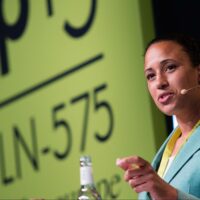 Nani Jansen Reventlow is an award-winning human rights lawyer specialised in strategic litigation at the intersection of human rights, social justice, and technology.
Nani Jansen Reventlow is an award-winning human rights lawyer specialised in strategic litigation at the intersection of human rights, social justice, and technology.
Trained as a litigator and with an extensive background in defending journalists and human rights activists in some of the most repressive environments in the world, Nani built on this experience when she founded the Digital Freedom Fund to advance digital rights through strategic litigation in Europe. Under Nani’s leadership over the past five years, the Digital Freedom Fund has achieved a central position in its field, developed remarkable organisational and financial solidity, and supported dozens of legal cases and built the capacity of litigators and rights activists across Europe. Her standard-setting work seeking to decolonise the digital rights field in Europe and breaking down the silos between social justice groups and digital rights activists saw her listed on Politico’s 2021 list of visionary tech leaders in Europe.
Through her work, Nani has seen first-hand how racialised and marginalised groups are disproportionally affected by the negative aspects of technology. Recognising the fundamentally unequal power structures in society and how they affect people’s ability to exercise their rights and achieve justice when they have been wronged or harmed, Nani is currently setting up a new organisation, Systemic Justice, which will help build the power of communities to use strategic litigation to develop a more just society.
Through her public speaking, academic work and teaching at some of the world’s leading universities, Nani is shaping the next generation of human rights lawyers and public policy professionals. Drawing on a long and distinguished career as a litigator and expert on the intersection between human rights, social justice and technology, her mentorship provides students a hands-on understanding of the challenges facing human rights and social justice movements in the twenty-first century.
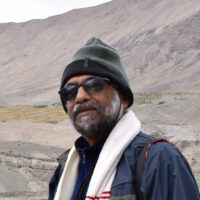 Ashish Kothari – Founder-member, Kalpavriksh; member, many people’s movements. Taught, Indian Institute of Public Administration; coordinated India’s National Biodiversity Strategy & Action Plan, served on boards of Greenpeace International & India, ICCA Consortium. Helps coordinate Vikalp Sangam (www.vikalpsangam.org), Global Tapestry of Alternatives (www.globaltapestryofalternatives.org), & Radical Ecological Democracy (www.radicalecologicaldemocracy.org). Co-author/co-editor, Churning the Earth, Alternative Futures, and Pluriverse: A Post-Development Dictionary
Ashish Kothari – Founder-member, Kalpavriksh; member, many people’s movements. Taught, Indian Institute of Public Administration; coordinated India’s National Biodiversity Strategy & Action Plan, served on boards of Greenpeace International & India, ICCA Consortium. Helps coordinate Vikalp Sangam (www.vikalpsangam.org), Global Tapestry of Alternatives (www.globaltapestryofalternatives.org), & Radical Ecological Democracy (www.radicalecologicaldemocracy.org). Co-author/co-editor, Churning the Earth, Alternative Futures, and Pluriverse: A Post-Development Dictionary
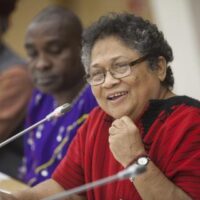 Dr. Myrna Cunningham of Nicaragua (1947 – ) is an important political leader of indigenous peoples in the Region of the Americas. A Misquito descent, Dr. Cunningham has worked for more than 50 years at the local, national, and international levels to advocate for human rights, the collective rights of indigenous populations, and women’s health in Nicaragua. She is a recognized activist in Central America and internationally, she has been the recipient of important awards and recognition for her contributions.
Dr. Myrna Cunningham of Nicaragua (1947 – ) is an important political leader of indigenous peoples in the Region of the Americas. A Misquito descent, Dr. Cunningham has worked for more than 50 years at the local, national, and international levels to advocate for human rights, the collective rights of indigenous populations, and women’s health in Nicaragua. She is a recognized activist in Central America and internationally, she has been the recipient of important awards and recognition for her contributions.
On 2 December 2002, in Washington D. C., the Pan American Health Organization selected Dr. Myrna Cunningham among other 11 individuals with the award Heroine of Public Health, for her invaluable health contributions in the Americas.
Cunningham belongs to the Miskitu indigenous people of the Waspam community located on the banks of the Wangki River in Nicaragua. After studying pedagogy, she returned to her home community to work as a teacher. Again, she leaves her community to study medicine and surgery at the National Autonomous University of Nicaragua, being the first Miskito woman to be a doctor. After completing her studies, she worked at the Missionary Hospital of the Morava Church as a general practitioner and later as a surgeon, work that she combined with her work in the public health of the Coco River communities until 1979.
In September 2010, she obtained an Honorary Doctorate from the National Autonomous University of Mexico, being the first time that UNAM granted such recognition to an indigenous woman. From 2011 to 2013 she was president of the UN Permanent Forum on Indigenous Issues.
Among her valuable research are studies on the forms of discrimination suffered by indigenous women and she has promoted the establishment of strategies and programs that facilitate their access to education at all levels.
Cunningham has been a member of important organizations, among them the following stand out: the Board of Directors of the Global Fund for Women, the Alliance of Indigenous Women of Mexico and Central America, the Continental Network of Indigenous Women, the Indigenos Parliament of America, the Association for Women’s Rights and Development (AWID) and the International Indigenous Women’s Forum.
She is currently president of the board of the Fund for development of indigenous peoples of Latina America and the Caribbea, Chair of Pawanka Fund and Tenure Facility in addition to being an international consultant in various international organizations.
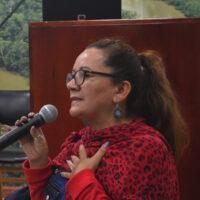 Elsa Nury Martinez Silva is a Member of the Board of Directors of SINPREAGRICUN – Union of Small Agricultural Producers of Cundinamarca – and current President of FENSUAGRO – the National Federation of Agricultural Unitary Trade Unions. She is a representative of the Latin American Coordination of Rural Organizations (CLOC) and an active member of La Via Campesina’s International Coordinating Committee (ICC) for the South American Region.
Elsa Nury Martinez Silva is a Member of the Board of Directors of SINPREAGRICUN – Union of Small Agricultural Producers of Cundinamarca – and current President of FENSUAGRO – the National Federation of Agricultural Unitary Trade Unions. She is a representative of the Latin American Coordination of Rural Organizations (CLOC) and an active member of La Via Campesina’s International Coordinating Committee (ICC) for the South American Region.
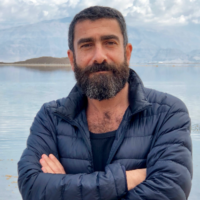 Moukhtar Kocache has over 25 years of expertise in philanthropic, cultural and civil society development. In 2015 he founded Rawa, a community-led participatory fund that supports innovative development initiatives throughout historic Palestine and advocates for improved and more just philanthropic practices and development aid. He worked at the Ford Foundation for almost a decade and has advised dozens of philanthropies worldwide and serves on the boards of a handful global foundations and INGOs.
Moukhtar Kocache has over 25 years of expertise in philanthropic, cultural and civil society development. In 2015 he founded Rawa, a community-led participatory fund that supports innovative development initiatives throughout historic Palestine and advocates for improved and more just philanthropic practices and development aid. He worked at the Ford Foundation for almost a decade and has advised dozens of philanthropies worldwide and serves on the boards of a handful global foundations and INGOs.
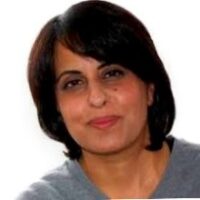 Poonam Joshi is Director of the Funders’ Initiative for Civil Society (FICS). Prior to this Poonam was the Executive Director of the Sigrid Rausing Trust. Poonam has worked on range of human rights issues as a lawyer, policy advisor and grant-maker, and has established and managed programmes to support civil society in the Middle East North Africa, South Asia, Central and Eastern Europe and Balkans.
Poonam Joshi is Director of the Funders’ Initiative for Civil Society (FICS). Prior to this Poonam was the Executive Director of the Sigrid Rausing Trust. Poonam has worked on range of human rights issues as a lawyer, policy advisor and grant-maker, and has established and managed programmes to support civil society in the Middle East North Africa, South Asia, Central and Eastern Europe and Balkans.
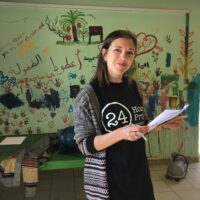 Carmen Dupont is an advocate and organiser with over one decade of experience campaigning on the rights of people on the move. She coordinated regional campaigns at Amnesty International before spending several years in Lesvos to support grassroots efforts led by local and refugee activists. Carmen is passionate about connecting people and issues around deep, positive change (Think big or go home!). She believes in the power of curiosity, active listening and asking new questions. This curiosity brought her to FundAction in 2018. In July 2020 she joined the Facilitation Group, who is responsible for the daily coordination. FundAction is a participatory grantmaker, supporting systemic change across Europe. The fund has over 270 members from grassroots initiatives who work on various themes across 29 countries.
Carmen Dupont is an advocate and organiser with over one decade of experience campaigning on the rights of people on the move. She coordinated regional campaigns at Amnesty International before spending several years in Lesvos to support grassroots efforts led by local and refugee activists. Carmen is passionate about connecting people and issues around deep, positive change (Think big or go home!). She believes in the power of curiosity, active listening and asking new questions. This curiosity brought her to FundAction in 2018. In July 2020 she joined the Facilitation Group, who is responsible for the daily coordination. FundAction is a participatory grantmaker, supporting systemic change across Europe. The fund has over 270 members from grassroots initiatives who work on various themes across 29 countries.
Selmin Çalışkan is Director of Institutional Relations at the Berlin office of the Open Society Foundations. Previously, she was the public face and voice as Secretary General of Amnesty International in Germany. In 2012, she worked at the European Women’s Lobby in Brussels and before that at the Gesellschaft für Internationale Zusammenarbeit (GIZ) in Kabul. For the German-based women’s rights organisation medica mondiale, she led international human rights advocacy and networking efforts of women’s rights activists in Afghanistan, Liberia, Kosovo and the Democratic Republic of Congo. In the 1990s, she co-created the migrant women’s centre ‘Gülistan’ and the intercultural, feminist girls’ centre ‘Azade’ in Bonn, where she worked with women and girls from migration and refugee backgrounds and advocated with them for their rights with political decision-makers. She was engaged in the early stages of establishing the first time strategic alliances between women of color, Jewish women and migrant women in Germany and the US.
Rose Longhurst–I’ve been thinking about the ways in which philanthropic foundations engage with social movements for nearly two decades. Being part of the first Facilitation Group at The Edge Fund (the UK/Ireland participatory grantmaker) deeply informed my work championing grassroots social justice groups, including helping to found FundAction in 2016. I currently work at Open Society Foundations, I’m a Senior Atlantic Fellow for Economic and Social Equality, and I’m proud to be on the board of Global Greengrants UK. Alongside my work in philanthropy, as a Filipina I adore Karaoke, so I’m your go-to person if you want to hear someone sing Abba passionately/ badly.
YOUR ROLE
It’s time for you all to submit your session ideas for the EDGE Conference! From October 11-13, we’ve scheduled two 2-hour Open Space slots per day so you can propose, organize and facilitate the sessions and content you think is most interesting. Since we have no physical limit in terms of (virtual) space, we will be able to schedule all sessions that are proposed which will run concurrently within the Open Space times.
Please feel to submit any and all open space sessions you are interested in! All are welcome, and we have more than enough space! We recently had a gathering where Europe-based EDGE members explored topics they would like to organise around, see the list below. If you are interested in some or several of these topics as well, feel free to reach out to Martin or submit a session proposal directly here. Obviously, we are open to shifting, combining or expanding all of those topics – whatever you would like to do, we can do it!


